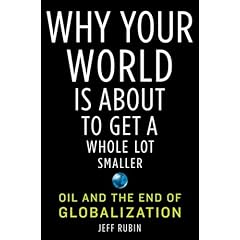Are we entering an age of reverse-globalization ?
Posted by Big Gav in globalisation, jeff rubin, peak oil
Tyler Hailton at Clean Break has a review of Jeff Rubin's book "Why Your World Is About to Get a Whole Lot Smaller: Oil and the End of Globalization" - Are we entering an age of reverse-globalization ?.
The International Energy Agency is getting a bit worried. It sees that low oil prices — or at least low compared to last summer — have led to under-investment in energy infrastructure, particularly exploration of oil and gas. It also knows that when the economy shifts into recovery mode demand will pick up fast and supply will be slow to respond. It predicts there will be a supply crunch by 2012, and of course that means oil prices will be rocketing back up.
This scenario, of course, may be understating the problem about to hit world economies, says former CIBC chief economist Jeff Rubin, whose new book Why Your World Is Going to Get a Whole Lot Smaller hit the market today. I’ve got a feature book review here, but in a nutshell Rubin believes conventional oil production has already peaked and unconventional production won’t be able to keep up with demand once global economies recover, and not just because of the incredible appetite the Chinese have for oil. Rubin argues that excessive consumption in the Middle East, massive local subsidies there for oil, and the use of oil-fired power plants to run energy-intensive desalination facilities will shrink the amount of oil supply that OPEC puts on the world market. Ultracheap cars to appear in India and likely to spread around the world, thanks to Tata Motors, will mean even more demand for oil products.
Oil prices are destined to once against skyrocket into triple-digit territory, and the impact will be inflation on everything, including our food and the fuel we use to drive our cars and heat/power our homes. In fact, gas prices will become so high that people will be forced to ditch their cars, housing prices in the suburbs will plunge, urban areas will grow more dense, and there will be a renaissance in local agriculture and urban farmers’ markets. The high cost of transporting goods from far-off markets will lead to the re-emergence of domestic manufacturing. High oil will override any labour-cost benefits that countries such as China can offer.
What Rubin is describing is essentially a deathblow to globalization and a return to regional economic trade, similar to what world trading patterns were like in the 1970s. And he’s not describing what the world will look like in 20, or even 10 years. I had a chance to meet Rubin for a quick coffee last week and he told me we’ll begin seeing the pattern emerge within the next 18 months, and that smart businesses and people should begin to adjust their lifestyle now if they hope to minimize the pain and discomfort of adapting to a new world. I told him I’m loving the fact I have a variable interest rate mortgage and am paying 1.35 per cent interest right now. His response: lock in now, cause it will be short-lived. It really got me thinking about my own situation.
Will we all be caught off guard by what’s to come if Rubin is right?
What’s interesting about Rubin is that he left a well-respected, high-paying job after 20 years at a major Canadian bank to focus exclusively on delivering the above message. And he’s not alone in trying to paint a picture of the smaller world to come. Christopher Steiner, a senior staff reporter at Forbes magazine, will be delivering a similar message when his new book, $20 Per Gallon, launches this July. Seems we’ve moved on from talk of reaching peak oil to discussion of how peak oil will impact us now that it’s here.
Rubin isn’t saying we’re going to have to stop using oil or that we’re going to run out. What he’s saying is that it’s going to become so expensive that it will cause inflation everywhere and will force many people, many businesses, to seek alternatives or simply get by with using less. With the exception of using less (i.e. conservation), all other options will be expensive. The oil companies don’t care, of course, because they’ll get top dollar for the barrels they do sell. The rest of us, we’ll just be screwed.
If you do get your hands on Rubin’s book I urge you to read Chapter 7 — “Just How Big Is Cleveland — in which he provides an excellent explanation of how high oil prices last summer caused the recession we are in right now. Rubin says high oil led to inflation, which equals higher interest rates, which caused many U.S. homeowners to default on their mortgages when they came up for renewal. When that started to happen the dominos began to fall and this exposed the underbelly of the mortgage-back securites fiasco that led to the crisis on Wall Street. High oil prices knocked down the house of cards that Wall Street had built over the years.





